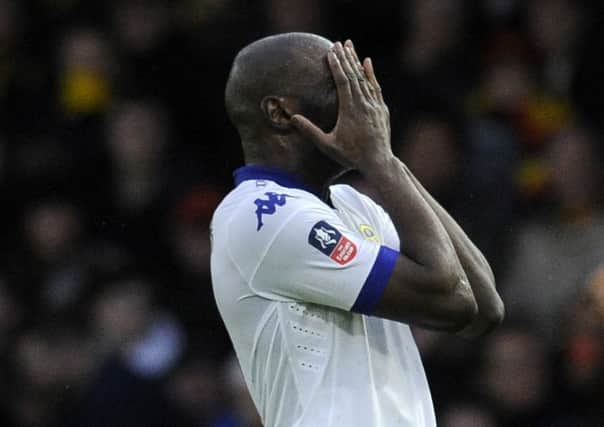Leeds United: Club stance on Doukara should be made public '“ Hay


The independent commission which heard Doukara’s testimony thought little of it and did not like his explanation for Fulham’s complaint against him.
Doukara said that the injury to Amorebieta – described by the panel on the basis of four photographs as “circular in nature and teeth marks can be seen at the outer edges of the mark” – must have been caused unintentionally by the impact of the pair colliding. When asked why he thought Fulham had pursued the matter, he told the panel that the club might be using the incident as a disingenuous way of weakening Leeds United and finishing higher in the Championship table.
Advertisement
Hide AdAdvertisement
Hide AdThe three-man commission rejected that theory and broadly rejected Doukara’s evidence. As one of five witnesses, including match referee Kevin Wright, the panel said Doukara “did not present well.” Among the reasons for handing Doukara an eight-game suspension, the panel said biting “is violent, serious and unusual and has no place in football.”
So what do Leeds United make of the verdict and what is their stance on Doukara’s offence? The written judgement, published by the Football Association on Monday, gave the club and Doukara the right of appeal and, if Doukara maintains his innocence, it figures that the striker might want to take the fight on.
He is no Luis Suarez, as a striker or a personality, and on that basis his ban has been less of a wall-to-wall story, but biting carries much the same taboo as spitting. You would not choose to have it on your record. And the average club would not simply let the matter go.
Leeds have, so far, limited their response to a single-line comment last month, a comment which appeared to support Doukara. “Suffice to say, the club is disappointed with the outcome and the length of the ban,” it said. At the time Leeds said they would not say any more until the written verdict was released by the FA. It is public now and where Doukara is concerned, it is not at all complimentary; of his actions against Fulham or his attempt to defend a charge of violent conduct.
Advertisement
Hide AdAdvertisement
Hide AdThis is a serious case in more than one way. For those who see footballers as role models – and there are many, former YEP columnist Danny Mills as an example, who argue against that description – biting sets a very poor example of discipline. For the club and for their head coach, this charge has cost them a player in a position where Leeds are light on options for eight games and two months. Doukara’s calibre in the Championship is a matter of opinion, but prior to losing him, Steve Evans started him in 16 consecutive matches. He was a fixture in the team, albeit in part because of Chris Wood’s injury.
It could be argued in mitigation that there has rarely been any great risk to Leeds of relegation this season. But Doukara could not have been certain of that in the last week of February, when the incident between him and Amorebieta occurred.
Whatever United’s stance, they cannot pass this off as ‘something and nothing’. Doukara protests his innocence and, if the club accepts his plea, then they should say so. During the disciplinary hearing, the lawyer representing Doukara and Leeds, Stephen Heath, questioned why Fulham had taken seven days to complain to the FA, saying the delay had prevented United from seeking a medical examination of the injury. Fulham’s secretary, Jennifer Urquhart, said she had been abroad on annual leave, an explanation which the commission accepted. Urquhart was viewed by the panel as a “reliable witness”. Fulham physio Tim Maynard, who took photos of Amorebieta’s injury, was also described as “reliable and believable”. Doukara’s was singled out as the weakest testimony.
Leeds were asked this week whether they would seek to appeal either the verdict or the length of Doukara’s ban. As yet they have not responded. They were also asked whether Doukara would face any internal club sanctions and whether they or the striker had any comment to make. Is the Frenchman prepared to flatly deny the offence publicly? And if not, will he apologise to Amorebieta, to United’s head coach, to the club’s other players or, hell, the supporters for an unsavoury allegation which is sidelining him until May 7? What action are Leeds considering taking against him, if any? This is not a run-of-the-mill disciplinary case. We should be told.